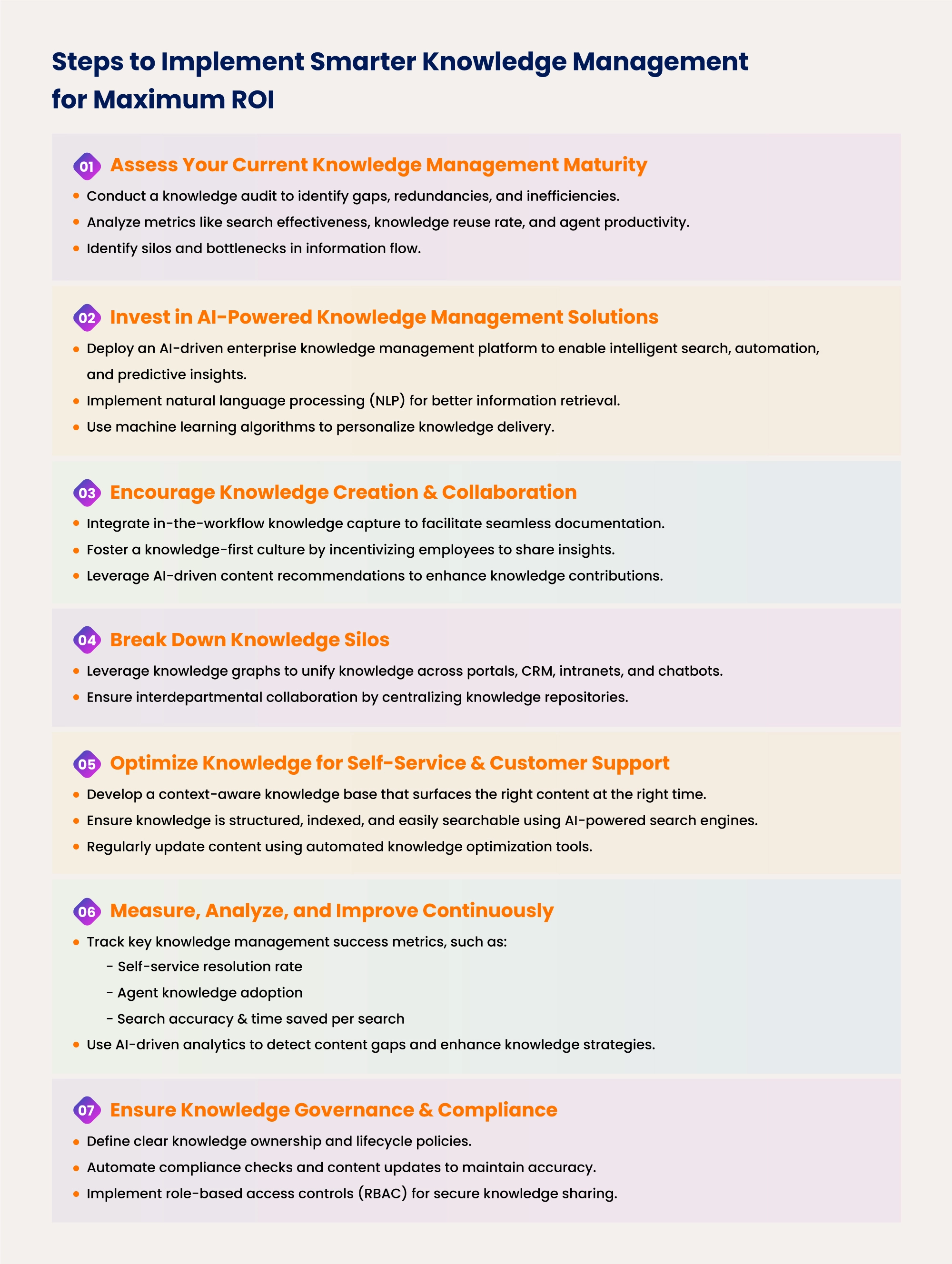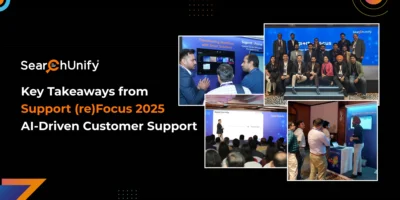
“Despite the challenges of measuring ROI in numerical terms, the value of well-managed knowledge is undeniable as it enhances organizational effectiveness and profitability through retention, innovation, and operational efficiency”
~ Nakash & Bouhnik
Enterprises in the current hyper-competitive landscape fail to implement a smart knowledge management strategy. That’s how they struggle with inefficiencies, high operational costs, and poor customer experience. Companies lose 42% of their knowledge due to turnover and lack of documentation. Essentially, without a strong enterprise knowledge management system, businesses risk revenue losses, reduced agent productivity, and dissatisfied customers. Now, let’s find out how businesses can maximize their knowledge potential and drive tangible outcomes.
Here’s Why Enterprises Must Prioritize Smarter Knowledge Management
1. Knowledge-Driven Businesses Outperform Their Competitors: McKinsey states that employees spend an average of 20% of their workweek searching for internal information or tracking down colleagues who can help with specific tasks. Thus, leading to higher costs, lower productivity, and slower decision-making.
Quick Fact: Enterprises that deploy AI-powered knowledge management solutions experience a 35% improvement in efficiency. And, firms with strong knowledge-sharing cultures achieve 3.9 times the revenue growth compared to competitors.
2. Smarter Knowledge Management Reduces Support Costs: In customer support, inefficient knowledge-sharing processes result in longer resolution times and higher operational costs. As rightly put by John Ragsdale, VP of Technology Research (TSIA), ‘’The future of knowledge management is AI-driven, proactive, and deeply integrated into business processes.’’
Quick Fact: 50% of customer service inquiries could be resolved through self-service if a well-structured knowledge base were available. Moreover, AI-powered intelligent knowledge discovery tools can reduce ticket resolution time by 40%, significantly cutting operational expenses.
3. Agentic-AI Powered Knowledge Management Boosts Customer Experience: Customers today expect instant answers. Enterprises using intelligent agentic knowledge management solutions ensure that support agents and customers can retrieve the right information at the right time, thus improving customer satisfaction. All of it by automating content creation, streamlining workflows, and delivering personalized, real-time information to both agents and
See how Knowbler helped companies like Automation Anywhere and Syntellis achieve exceptional results.
Reminders for Building a Smarter Knowledge Management Strategy

Components of a High-ROI Knowledge Management Strategy
In an era where knowledge drives competitive advantage, a high-ROI knowledge management strategy is essential for organizational success.
1. Intelligent Knowledge Discovery: Traditional search functions often fail due to fragmented data across multiple systems. AI-powered knowledge management software like SearchUnify Knowbler enables context-aware search, providing relevant, personalized, and real-time information to employees and customers alike.
2. Capturing and Sharing Tacit Knowledge: 80% of enterprise knowledge is tacit—locked in employees’ minds. Encouraging seamless knowledge sharing within workflow tools ensures valuable insights don’t get lost.
3. Breaking Down Knowledge Silos with AI-Powered Knowledge Graphs: Siloed knowledge hinders efficiency. AI-powered knowledge graphs help unify information across departments, support portals, and CRM systems.
4. Measuring Knowledge Effectiveness with AI Analytics: Organizations must track how knowledge impacts business operations. AI-powered analytics assess knowledge adoption, gaps, and effectiveness.
Key Metrics to Track:
- Self-service success rate: Are customers resolving queries independently?
- Agent knowledge adoption: How frequently is documented knowledge being used?
- Knowledge reuse rate: Are teams leveraging existing content instead of duplicating efforts?
5. Leveraging AI for Continuous Knowledge Optimization: AI-driven knowledge automation ensures that content remains up-to-date, relevant, and easily accessible.
Thus, effective knowledge management not only boosts ROI but also cultivates a culture of continuous learning and innovation.

So, Why Not Make Knowledge Management A Competitive Advantage?
Enterprises prioritizing smarter knowledge management see significant cost savings, efficiency improvements, and enhanced customer satisfaction. Knowledge management solutions like SearchUnify Knowbler enable enterprises to move beyond traditional KM limitations by enabling real-time knowledge creation, reducing silos, and enhancing knowledge discoverability.
So, if you want to maximize your KM ROI, it’s time to take the first step towards a smarter, AI-driven knowledge management strategy.
Frequently Asked Questions
1. How does AI enhance the ROI of knowledge management?
AI improves knowledge discovery, automates content updates, and enhances personalization, leading to higher productivity and reduced costs.
2. What industries benefit the most from smarter knowledge management?
Industries like customer support, IT services, healthcare, financial services, and telecom see the most impact from AI-powered knowledge management solutions.
3. How do AI agents improve information retrieval in organizations?
AI agents analyze user intent, context, and past interactions to deliver the most relevant knowledge instantly, reducing search time and improving decision-making.
4. What is the impact of knowledge silos on business performance?
Siloed knowledge slows decision-making, increases support costs, and reduces overall efficiency. Breaking silos with intelligent knowledge graphs ensures seamless knowledge flow.
5. How can companies measure the success of their knowledge management strategy?
Organizations should track self-service success rates, agent knowledge adoption, search accuracy, and knowledge reuse metrics to assess KM effectiveness.











